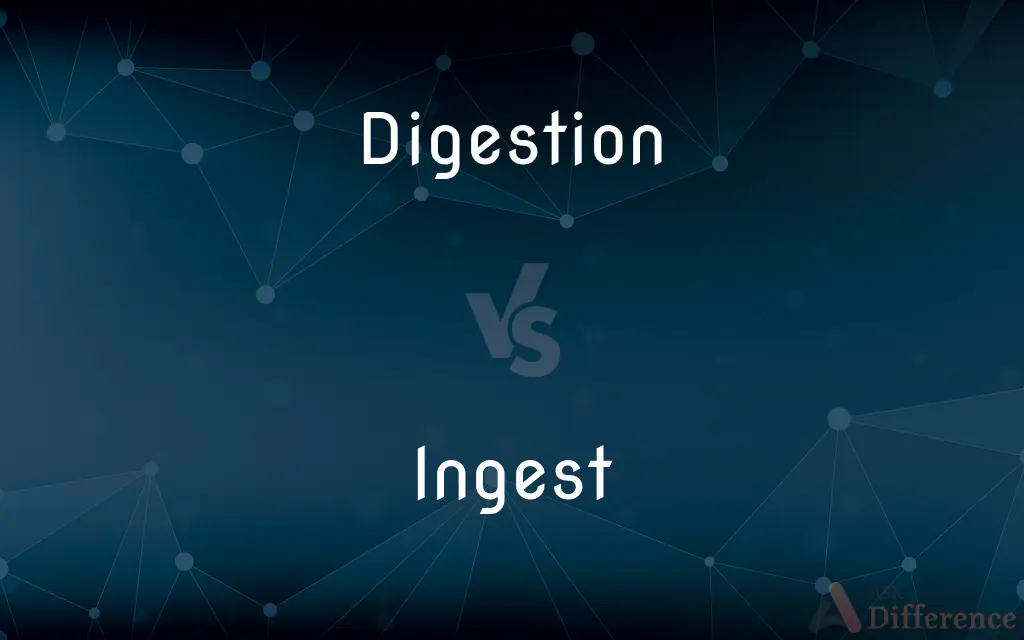Digestion vs. Ingest — What's the Difference?
By Urooj Arif & Fiza Rafique — Updated on March 20, 2024
Digestion is the biological process of breaking down food into absorbable nutrients, while ingest refers to the act of taking food or substances into the body through the mouth.

Difference Between Digestion and Ingest
Table of Contents
ADVERTISEMENT
Key Differences
Digestion involves the complex breakdown of food into smaller, absorbable components, primarily occurring in the stomach and intestines. This process includes both mechanical actions, like chewing and churning, and chemical actions, involving enzymes and other digestive fluids. On the other hand, ingest is the initial step in the eating process, where food or other substances are taken into the body through the mouth.
While ingestion is the act that starts the digestive process, enabling substances to enter the digestive tract, digestion encompasses a series of biochemical and physical processes that transform the ingested food into nutrients that the body can use. Ingestion is a voluntary act of eating or drinking, whereas digestion is an involuntary process controlled by the body's digestive system.
The purpose of digestion is to extract and absorb nutrients from food to support the body's functions, including energy production, growth, and cell repair. In contrast, ingestion simply refers to the intake of food and liquids, without specifying the nature or the nutritional value of what is consumed.
Digestion requires the coordinated work of various organs, including the stomach, intestines, pancreas, liver, and gallbladder, each contributing to the breakdown and absorption of nutrients. Meanwhile, ingestion involves primarily the mouth and acts as the gateway for food and liquids to enter the digestive system.
Understanding the distinction between digestion and ingestion is crucial in nutritional science and health, highlighting the importance of not just what we eat (ingestion) but also how our body processes and utilizes these foods (digestion).
ADVERTISEMENT
Comparison Chart
Definition
The process of breaking down food into absorbable nutrients.
The act of taking food or substances into the body through the mouth.
Main Processes
Mechanical and chemical breakdown of food.
Intake of food and liquids.
Occurs In
Stomach and intestines.
Mouth.
Control
Involuntary, controlled by the digestive system.
Voluntary, controlled by individual choice.
Purpose
To extract and absorb nutrients from food.
To introduce food and liquids into the digestive system.
Involves Organs
Stomach, intestines, pancreas, liver, gallbladder.
Primarily the mouth.
Compare with Definitions
Digestion
Process involving stomach and intestines.
Digestion begins in the mouth but mainly occurs in the stomach and intestines.
Ingest
Taking substances into the body.
Medications are ingested orally for immediate effect.
Digestion
Utilizes enzymes and acids.
Enzymes play a crucial role in digestion by breaking down proteins.
Ingest
Begins the digestive process.
Once you ingest food, your body starts the complex process of digestion.
Digestion
Breakdown of food into nutrients.
Digestion transforms complex carbohydrates into simple sugars.
Ingest
Voluntary intake of food.
Choosing what to ingest can significantly impact your health.
Digestion
Involuntary bodily function.
Digestion continues even while you sleep, breaking down the dinner you ate.
Ingest
Involves chewing and swallowing.
Properly chewing your food makes it easier to ingest and digest.
Digestion
Results in nutrient absorption.
Efficient digestion is vital for proper nutrient absorption.
Ingest
Act of consuming food.
To ingest a healthy meal is the first step towards good nutrition.
Digestion
The process by which food is converted into substances that can be absorbed and assimilated by a living organism. In most animals it is accomplished in the digestive tract by the mechanical and enzymatic breakdown of foods into simpler chemical compounds.
Ingest
To take into the body by the mouth for digestion or absorption.
Digestion
The ability to digest food.
Ingest
To take in and absorb as food
"Marine ciliates ... can be observed ... ingesting other single-celled creatures and harvesting their chloroplasts" (Carol Kaesuk Yoon).
Digestion
(Biochemistry) The process of decomposing complex organic substances into simpler substances, as by the action of enzymes or bacteria.
Ingest
(transitive) To take (a substance, e.g., food) into the body of an organism, especially through the mouth and into the gastrointestinal tract.
Digestion
(Chemistry) The process of softening or disintegrating by means of chemical action, heat, or moisture.
Ingest
To cause (an undesired object or fluid) to enter the engine, generally via the intake.
The plane's engine ingested a large bird and flamed out.
Digestion
Assimilation of ideas or information; understanding.
Ingest
(transitive) To bring or import into a system.
Digestion
The process, in the gastrointestinal tract, by which food is converted into substances that can be utilized by the body.
Ingest
The process of importing data or other material into a system.
Digestion
The result of this process.
Ingest
To take into, or as into, the stomach or alimentary canal.
Digestion
The ability to use this process.
Ingest
To take into the body by any means, as by inhalation, injection, absorption, as well as through the mouth.
Digestion
The processing of decay in organic matter assisted by microorganisms.
Ingest
Serve oneself to, or consume regularly;
Have another bowl of chicken soup!
I don't take sugar in my coffee
Digestion
The assimilation and understanding of ideas.
Ingest
Take up mentally;
He absorbed the knowledge or beliefs of his tribe
Digestion
Generation of pus; suppuration.
Digestion
(chemistry) Dissolution of a sample into a solution by means of adding acid and heat.
Digestion
The act or process of digesting; reduction to order; classification; thoughtful consideration.
Digestion
Generation of pus; suppuration.
Digestion
The process of decomposing organic matter (as in sewage) by bacteria or by chemical action or heat
Digestion
The organic process by which food is converted into substances that can be absorbed into the body
Digestion
Learning and coming to understand ideas and information;
His appetite for facts was better than his digestion
Common Curiosities
Can you control your digestion process?
Digestion is involuntary and automatically regulated by the digestive system.
How does ingestion relate to digestion?
Ingestion is the first step that introduces food into the digestive system, where digestion then occurs.
What happens if digestion is impaired?
Impaired digestion can lead to malnutrition, discomfort, and various gastrointestinal disorders.
Are there substances that cannot be digested?
Yes, some substances, like certain fibers, are not digestible and pass through the digestive system unchanged.
Why is digestion important?
It's essential for breaking down food into nutrients the body can absorb and use.
How long does digestion take after ingestion?
The entire digestive process can take anywhere from 24 to 72 hours after ingestion.
Is ingestion the same as eating?
Yes, ingestion is the scientific term for the act of eating or drinking.
Can digestion occur without ingestion?
No, without ingestion to introduce food, there's nothing in the digestive tract to digest.
Does the quality of what you ingest affect digestion?
Absolutely, healthier foods typically promote better digestion, while processed foods may hinder it.
What factors can affect digestion?
Diet, health conditions, stress, and exercise can all impact the digestion process.
What's the difference between absorption and digestion?
Digestion is the breakdown of food into smaller components, while absorption is the process of these components entering the bloodstream.
How do the stomach and intestines contribute to digestion?
The stomach uses acids and enzymes for chemical breakdown, while the intestines absorb nutrients and water.
Can you improve your digestion?
Yes, through a balanced diet, regular exercise, and adequate hydration, among other healthy lifestyle choices.
Why is it important to be mindful of what you ingest?
Because what you ingest directly affects your digestion and overall health, influencing your body's nutrient intake and energy levels.
What is the role of the mouth in ingestion?
The mouth is where ingestion begins, involving chewing and the mixing of food with saliva.
Share Your Discovery

Previous Comparison
Teacher vs. Mentor
Next Comparison
Lygophobia vs. NyctophobiaAuthor Spotlight
Written by
Urooj ArifUrooj is a skilled content writer at Ask Difference, known for her exceptional ability to simplify complex topics into engaging and informative content. With a passion for research and a flair for clear, concise writing, she consistently delivers articles that resonate with our diverse audience.
Co-written by
Fiza RafiqueFiza Rafique is a skilled content writer at AskDifference.com, where she meticulously refines and enhances written pieces. Drawing from her vast editorial expertise, Fiza ensures clarity, accuracy, and precision in every article. Passionate about language, she continually seeks to elevate the quality of content for readers worldwide.














































